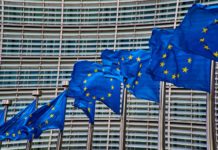Information reported that the White House is considering postponing the deadline for the submission of federal taxes. It is also studying a package of measures that can be adopted to provide economic relief to Americans without consulting Congress.
And the received news confirms that the expected new date for paying taxes is set for July 15th, with the possibility to extend it to September 15th or until December 15th.
The debate in the White House also revolves around the moratorium on new federal regulations, and deliberations are taking place over whether the president can take executive measures to protect companies from lawsuits if employees become infected with coronavirus while at work.
Unemployment rate will hit 20%
These measures come in light of the anticipated release of the jobs report, which is not likely to be positive, as the president’s advisers expect that the unemployment rate will hit 20%, which is six times the unemployment rate before the epidemic hit. On Thursday, May 7, the Department of Labor announced that the equivalent of 3.2 million Americans filed for the first time for unemployment benefits, bringing the total number to more than 34 million in just seven weeks.
Among the proposals being considered by the White House also raise the stone and the return of Americans to work. An official confirmed that this procedure is subject to evaluation pending the outcome of the situation in the countries that started to reopen its economy.
Earlier expectations indicate that the situation will get worse during the summer and autumn if companies continue to be closed, such as the high rate of unemployment to more than 30% and the widespread collapse of nearly 50% of small companies in the country if not more.
The high rate of unemployment to more than 30% and the widespread collapse of nearly 50% of small companies
These expectations have already infuriated Trump while he is vaunting in his speech about the state of the union only three months ago: “our economy is the best as it has ever been.”
This justifies the president’s assertion that the country should be reopened sooner and rushed to do so.
Among the suggestions that President Trump can adopt, following his consultations with a group of economic and external advisors on the current situation, are the tax break for real estate and stock sales and the suspension of rules to accelerate potential drug treatments and support tax cuts in salaries, as well as infrastructure spending, despite Warnings of additional spending from some members of his party.
In addition, Vice President Mike Pence plans to meet meat suppliers and grocery chain officials in Iowa on Friday as part of reassuring public opinion and reducing the possibility of meat shortages, stressing that there may be some” harassment “but” nothing dramatic”.
Despite the negative expectations, the President and his aides renew their optimism and confirm that this situation will be temporary if the country reopened as soon as possible, hoping that signs of economic improvement will appear during the presidential campaign.
In this context, White House spokesman Judd Deere said that Trump’s trade and energy policies, tax break and federal regulations cuts before the economic downturn will help the economy thrive again.
As President Trump said: “We are going to ensure to take care of all Americans so that we emerge from this challenge stronger and with a growing economy.”
This stage is considered the biggest challenge for Trump if the situation does not improve, as he had made many great promises during his first presidential term and was planning to base his re-election propaganda on the economic gains that he had achieved, but the winds blew against what was expected.
While President Aides admit that while the pain is short-lived, its impact on millions of Americans will be brutal.
Larry Kudlow, National Economic Council director admitted, in a speech to CNN, “It will be very difficult in the coming months, no doubt,” acknowledging that rapid growth may not be seen until 2021.
Consequently, the economic crisis adds to the crisis of public health management to face the pandemic.
In this context, the amendment made by Trump to the coronavirus task force falls amid concerns about what the next stage will look like after Trump indicated that it will stop, then reversed the course to say that it will continue.
























